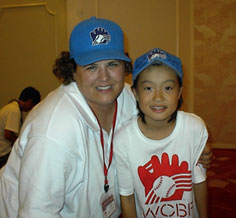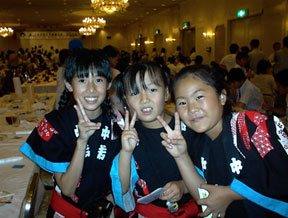World Children's Baseball Fair
In August of 2003, Deb traveled to Yamaguchi, Japan for the World Children’s Baseball Fair. This fair, which has been held annually in Japan, Canada or the United States since 1989, aims to bring together children of different cultural backgrounds to play a commonly loved game. The organization was founded by Hank Aaron, Sadaharu Oh, and Dr. Akiko Agishi as a means of teaching children the importance of “teamwork, good health, discipline and friendship.” Deb watched over five ten-year-old American children (two girls and three boys) during this ten day adventure.
Deb’s involvement in the event began when she received a call from
representative from the World Children’s Baseball Fair. The woman
on the phone explained that she had been selected as a chaperone for
the children who would be attending the fair from the United States.
All of Deb’s expenses throughout the trip would be paid.
Deb
never doubted that this was something she wanted to do, but as time went
on she became more nervous about the trip. She had never been solely
responsible
for anyone else’s children and had definitely never traveled out of the
country with children that young. When asked what it was like traveling
with the young athletes to a foreign country, Deb replied, “The biggest
part of that was getting five children to Japan and back without losing them
- that was the most important thing. And I don’t have children, so that
was really weird. I came back and I always felt like I was missing something.”
Before departing, Deb had only 20 minutes at the airport to get to know
the children who were going on the trip and their parents. Then it
was off to Japan. The group
first flew to Tokyo and spent one night there. Deb commented how the children
were not used to the time change and so were still wide awake at 3:00 in the
morning. The next day they flew to another island where the fair was to be held.
About 200 children from various countries across the world participated
in the fair. The children spent half of each day in baseball activities
and the other
half in other fun activities, such as swimming or competitive games. Children
from the community would also join in during some of the non-baseball activities,
which brought the number of children participating in the event to around 500.
The organization provided each child with everything they needed throughout the
course of the camp, including uniforms, new gloves and cleats. Each child even
received ten yen to spend however he or she wished before going home.
The children were split up so that everyone was with a chaperone of the
same gender for most of the time. Therefore, the three American boys
were mainly watched
over by a male chaperone from another country and Deb gained responsibility for
a few girls from other countries. Some of the children did not speak English,
but Deb mentioned that this did not stop the children from getting along. She
said, “I’ve never had that experience of playing with someone
who spoke another language, but they all seemed to know exactly what they were
doing.”
One of the things Deb remembers most about
her trip to Japan was what she called
the “culture shock.” There were many things about Japan that were
different from what she was used to in the United States, such as the food and
their customs. The children often had a hard time adjusting to these differences
as well. Even the game of baseball was a different experience in Japan. Deb commented, “Baseball
is different in Japan. Baseball is sacred. The kids weren’t allowed to
chew gum on the field…men don’t spit on the field. You know, it’s
sacred ground when you get to Japan…It’s very respectful…From
the beginning they were told to be respectful to the coaches and say please and
thank you - probably not what some kids are used to doing here.”
In addition, Deb also noticed a difference in how women in baseball are
viewed by other countries and how they are viewed in the United States.
Deb was one
of only two female coaches at the entire event. She commented, “For the
US girls, that was great. No other country really cared. They didn’t see
anything unusual about it.”
Deb returned to the United States after the event, having taken multiple
pictures to remember her adventure in Japan.